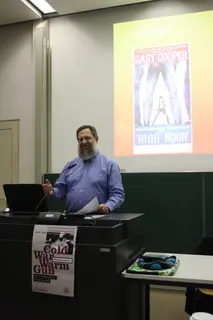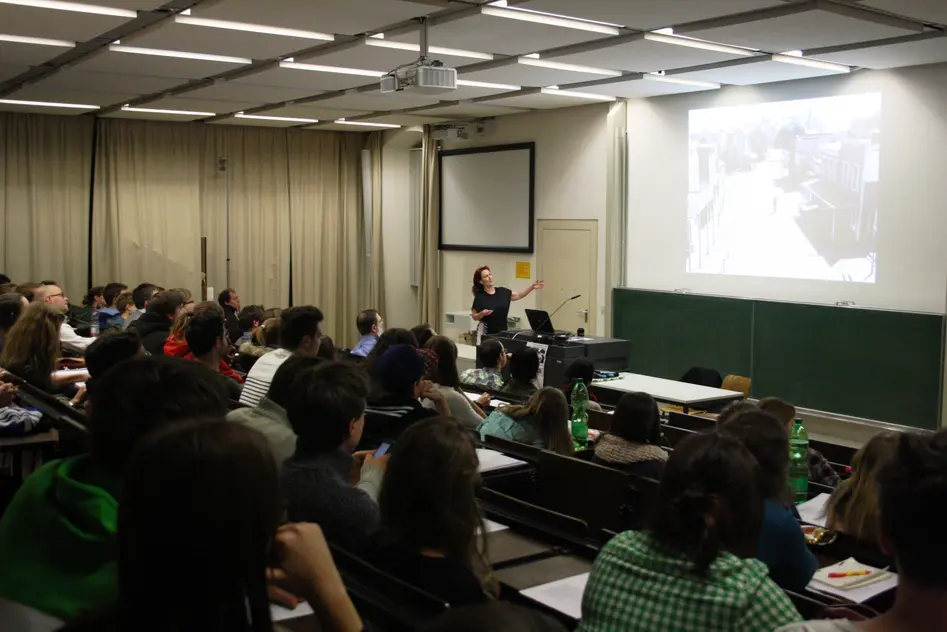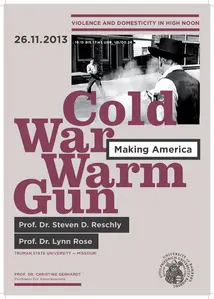Dr. Steven D. Reschly and Dr. Lynn Rose (Truman State University): "Cold War, Warm Gun: Violence and Domesticity in High Noon (1952)"
Tuesday, 26.11.2013, 16:15–17:45 Uhr, U5/00.24
The western film was a cultural tradition in U.S. theaters and in many American living rooms--and beyond--throughout the twentieth century. Rollicking with dusty adventure and bursting with solitary masculinity, most westerns managed to get almost everything wrong, at least from a historical perspective. As a window into twentieth-century perceptions about the making of American ideals, however, there are few better sources of information. “High Noon,” released during the Korean War and the Hollywood Black List, showcases three especially intriguing themes. Although it lacks the standard motifs of Indians, stampedes, and, mercifully, campfire songs, it reveals three gendered themes particularly well.
Using clips from the film, Dr. Reschly and Dr. Rose discussed the theme of Cold War/Warm Hearth, in which victory over evil (i.e.,Communism) was ensured by an idealized bastion of family and masculine resolve. They looked at how the Warm Hearth is tended by the Good Woman and her opposite, the “tart with a heart” and how the portrayal of ultimate masculine ability is heightened by its counterpart, the ever-present threat of emasculating disability. Taken together, their reading of “High Noon” through the lenses of gender, sexuality, and disability offered what it had promised: a fresh interpretation of an American classic that provided for an engaging audience discussion.

Dr. Steven D. Reschly’s teaching interests include American social history, women’s history, Frontier and West, and history of sexuality. His current research examines rural consumer culture in Amish and related groups in 1930s Lancaster County, Pennsylvania. His first book, The Amish on the Iowa Prairie, 1840-1910 (Johns Hopkins, 2000), was named the 2002 Book of the Year by the Communal Studies Association. His second book is a co-edited collection, Strangers at Home: Amish and Mennonite Women in History (Johns Hopkins, 2002). In 2003-2004, he taught at the Martin Luther University of Halle-Wittenberg in Germany as a Fulbright Senior Scholar. He has led nine Study Abroad courses in Europe, taking over 100 students overseas. He is a member of the American Historical Association, Organization of American Historians, Agricultural History Society, Women's and Gender Historians of the Midwest, Western Historical Association, and Rural Women’s Studies Association.
Dr. Lynn Rose's specialties are ancient history and disability studies. Along with other publications, she has published one book, The Staff of Oedipus: Transforming Disability in Ancient Greece (University of Michigan Press, 2003). She was awarded a Mary E. Switzer Distinguished Fellowship for 2003-2004 to support her research project on intellectual disability in ancient Greece. She spent one year with the Institute for Greek and Latin Language and Literature at the University of Halle-Wittenberg and received a Fulbright scholarship for teaching one year at the University of Rostock. Dr. Rose, who was named Truman’s Educator of the Year in 2005, as well as the CASE (Carnegie) National Educator for Missouri in 2006, travels internationally whenever she has the chance.

